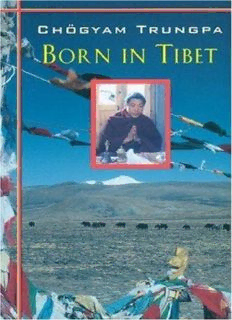
Born In Tibet PDF
Preview Born In Tibet
Center: Marpa the Translator, father of the Kagyü school. Clockwise from top: Vajradhara Buddha with two Indian gurus, Gampopa, Mahakala (the Protector), Karmapa, Vajra Yogini (female divinity), and Milarepa. DRAWN BY SHERAB PALDEN BERU. BORN IN TIBET by CHÖGYAM TRUNGPA The eleventh TRUNGPA TULKU as told to ESMÉ CRAMER ROBERTS With Forewords by THE SAKYONG MIPHAM RINPOCHE and MARCO PALLIS Fourth Edition SHAMBHALA Boston & London 2010 To my Mother and motherland Shambhala Publications, Inc. Horticultural Hall 300 Massachusetts Avenue Boston, Massachusetts 02115 www.shambhala.com © 1966 by George Allen & Unwin Ltd. Epilogue © 1977 by Chögyam Trungpa Foreword to the 1995 Edition © 1995 by Diana Mukpo All rights reserved. No part of this book may be reproduced in any form or by any means, electronic or mechanical, including photocopying, recording, or by any information storage and retrieval system, without permission in writing from the publisher. The Library of Congress catalogues the 1985 edition of this book as follows: Trungpa, Chögyam, 1939– Born in Tibet. Reprint. Originally published: Boulder, Colo.: Shambhala, 1977, c1966. Includes index. 1. Trungpa, Chogyam, 1939– . 2. Lamas—China—Tibet—Biography. I. Roberts, Esmé Cramer. II. Title. BQ990.R867A33 1985 294.3 923 0924 [B] 85-8174 eISBN 978-0-8348-2130-9 ISBN 0-87773-333-3 ISBN 0-394-74219-2 ISBN 1-57062-116-0 ISBN 1-57062-714-2 CONTENTS FOREWORD TO THE 1995 EDITION FOREWORD TO THE 1977 EDITION ACKNOWLEDGMENTS How to Pronounce Tibetan Names and Words 1. Found and Enthroned 2. The Founding of Surmang 3. Dütsi Tel and Namgyal Tse 4. My Childhood at Dütsi Tel 5. In the Steps of the Tenth Trungpa 6. I Go to My Guru 7. Death, Duties and a Vision 8. A Many-Sided Training 9. The Dalai Lama’s Visit 10. Khampas in Revolt 11. Lonely Vocation 12. Into Hiding 13. Must We Escape? 14. It Must Be India 15. Refugees on the Move 16. Traveling the Hard Way 17. Days of Crisis 18. Touch and Go! 19. Across the Himalaya Song of the Wanderer in Powo Valley Epilogue to the 1977 Edition Epilogue to the 1971 Edition APPENDIX 1 The Administration of the Kagyü Monasteries of East Tibet APPENDIX 2 The Doctrine of Tulkus GLOSSARY INDEX Foreword to the 1995 Edition W HEN I THINK back upon my father’s life, it amazes me how much he accomplished in such a short time. He was only forty-eight years old when he passed away, but within that time, the experiences he had and the people he encountered were as varied and rich as if he had lived for hundreds of years. Often people would ask him how he was able to adapt to so many diverse cultures, and how he was able to deal with the tremendous hardships of his life. Always his answer would be that it was due to the rigorous traditional training and education that he received in Tibet while he was young. It might appear to the reader that the Tibet of Chögyam Trungpa’s youth was medieval; it seems so distant from today’s modern world, and so harsh. Ironically, however, it was that very training, with its simplicity and realness, that gave him the foundation that enabled him to relate with this modern world. My father had two distinct roles in his life, corresponding with the periods of his life spent in the East and the West. During the first part of his life, since he was recognized as the incarnation of a famous teacher, people had high expectations of him. Many of the lamas and monks at the monastery were quite concerned that he be able to fit into his traditional role and continue the work of his predecessor. He very much had to fulfill the ambitions of the monastic community, as well as those of the laypeople of his religion. Once he left Tibet, his role was quite different—almost totally the opposite. In the West, very few people knew much about Buddhism as a whole, and they knew even less about the role of a lama, a spiritual teacher. People had little basis for any kind of expectations. In many ways, this was incredibly liberating for Chögyam Trungpa, and in fact it enabled him to become one of the most prominent Buddhist teachers of his time. His unique gift was that he was able to synthesize the ancient wisdom of Buddhism and transmit it to the West in a clear and concise way that was both meaningful and refreshing—so much so that a new generation of Western practitioners was born. Born in Tibet is a unique book, one that I personally have always loved to read. It is not just a historical document, a book about Tibetan culture, but it reveals many subtleties of what that life was actually like. It shows the spiritual development of teacher and disciple, and it illustrates the humanness that everyone possesses, regardless of culture, and the politics that come about from that. Even though my father was not particularly a nostalgic person, he had tremendous pride in his Tibetan heritage, which he transmitted to me in various ways. Occasionally in the middle of the night, we would prepare bandit soup together. This was one of his favorite Tibetan delicacies, which was simply raw meat with hot water poured over it. Knowing the tremendous hardships and challenges that confronted Chögyam Trungpa, and how he was able to overcome them through his courage, humor, and his faith in the spiritual disciplines of Tibet, I have always found this book inspiring. I hope that you too may be inspired by his example, and that this book will continue to benefit numberless beings. THE SAKYONG MIPHAM RINPOCHE November 25, 1994 Karmê Chöling
Description: